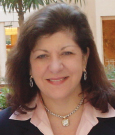Margaret Foti, PhD, MD (hc), Chief Executive Officer of the American Association for Cancer Research (AACR), received the Ellen V. Sigal Advocacy Leadership Award from the national advocacy organization Friends of Cancer Research (Friends) at its 18th Annual Cancer Leadership Awards Reception held recently in Washington, DC.
This is the second year Friends of Cancer Research has awarded the Ellen V. Sigal Advocacy Leadership Award, named for the chairperson and founder of Friends to celebrate her lifelong commitment to science, research, and patient advocacy.
Steadfast Advocacy
“Friends of Cancer Research is truly honored to recognize Margaret Foti as the second recipient of the Sigal Advocacy Leadership Award,” said Ellen Sigal, PhD, Chairperson and Founder of Friends. “Her dedication to cancer research, trailblazing work as CEO of the AACR, and steadfast advocacy for science and patients is unparalleled and invaluable to all in the community.”
The award honors advocates who have made unprecedented contributions to the cancer research community. Dr. Foti serves as Chief Executive Officer of the AACR. During her long tenure, AACR membership has grown from 3,000 to more than 35,000 laboratory, translational, clinical, and population scientists; other health-care professionals; and cancer advocates residing in 97 countries. Under Dr. Foti’s leadership, the organization’s scientific meetings, peer-reviewed journals, and science and public policy work have flourished, furthering progress against cancer through research, education, communication, and collaboration.
Groundbreaking Partnerships
“Ellen Sigal is a true visionary, an advocate, a collaborator, and a dear friend. She has made an enormous impact by fostering groundbreaking partnerships in the cancer field to discuss national policies and solutions that will accelerate the development of effective treatments for patients,” Dr. Foti said. “I am deeply honored to receive this award bearing her name.
“I am immensely proud of AACR’s accomplishments in the battle against cancer over the years, but there is much more work to be done,” she continued. “We will continue to provide support and opportunities for professional development to basic researchers and physician-scientists at all stages of their careers, so that they can continue to make the advances that lead to more cures.” ■


